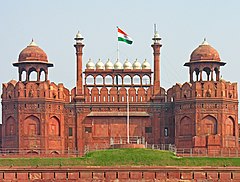Indian Independence Day
| Independence Day | |
|---|---|

The national flag of India hoisted on the Red Fort in Delhi; hoisted flag is a common sight on public and private buildings on Independence Day.
|
|
| Observed by |
|
| Type | National holiday |
| Celebrations | Flag Hoisting, parade, Singing Patriotic Songs and the national anthem, Speech by the Prime Minister and President of India |
| Date |
15 August 1947 ; 70 years ago |
| Frequency | Annual |
15 August 1947 ; 70
Independence Day, is annually observed on 15 August as a national holiday in India commemorating the nation's independence from the British Empire on 15 August 1947. India attained independence following an Independence Movement noted for largely nonviolent resistance and civil disobedience led by the Indian National Congress (INC). Independence coincided with the partition of India, in which the British Indian Empire was divided along religious lines into the Dominions of India and Pakistan; the partition was accompanied by violent riots and mass casualties, and the displacement of nearly 15 million people due to sectarian violence. On 15 August 1947, Jawaharlal Nehru, who had become the first Prime Minister of India that day, raised the Indian national flag above the Lahori Gate of the Red Fort in Delhi. On each subsequent Independence Day, the prime minister has raised the flag and given a speech.
The holiday is observed throughout India with flag-hoisting ceremonies, parades and cultural events.There is a national holiday and schools and government offices distribute sweets but no official work is done.
European traders had established outposts in the Indian subcontinent by the 17th century. Through overwhelming military strength, the British East India company subdued local kingdoms and established themselves as the dominant force by the 18th century. Following the First War of Independence of 1857, the Government of India Act 1858 led the British Crown to assume direct control of India. In the decades following, civic society gradually emerged across India, most notably the Indian National Congress Party, formed in 1885. The period after World War I was marked by British reforms such as the Montagu–Chelmsford Reforms, but it also witnessed the enactment of the repressive Rowlatt Act and calls for self-rule by Indian activists. The discontent of this period crystallised into nationwide non-violent movements of non-cooperation and civil disobedience, led by Mohandas Karamchand Gandhi.
...
Wikipedia
